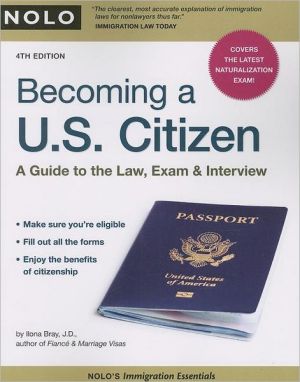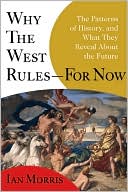Becoming a U.S. Citizen: A Guide to the Law, Exam & Interview
Seeking citizenship? Here's everything you need to know! The path from green card to U.S. citizenship can be a long and winding one -- and bureaucratic hassles are inevitable. But with Becoming a U.S. Citizen, you can shave months or years off the time it takes to become a citizen. Find out how to: determine your eligibility make sure you won't risk deportation by applying fill out application forms study for the citizenship exam have a successful interview deal with setbacks...
Search in google:
The path from green card to U.S. citizenship can be a winding one-and running into bureaucratic hassles is inevitable. But with Becoming a U.S. Citizen, you can shave years off the time it takes to become a citizen.This all-in-one book will take you through the application process from beginning to end, helping you to: *make sure you are eligible (and won't risk getting deported if you apply)*use special exceptions for disabled persons, military personnel, spousesof citizens and others*prepare the application forms and documents*study for the citizenship exam*have a successful interview*deal with delays, lost applications or other complications*enjoy your new status as a U.S. citizen*help family members immigrate The revised 2nd edition details the INS reorganization under the Department of Homeland Security, new government guidelines on requesting fee and exam waivers, the new right to posthumous citizenship for U.S. soldiers killed in action and much more. Becoming a U.S. Citizen provides the most current forms, with line-by-line instructions to fill them out, plus handy checklists that help you organize the application and interview materials. ForeignerInAmerica.com Covers topics that most other guides don't, helping you to avoid troublespots.
Introduction\ \ Many people spend their entire lives in the United States without ever trading in their green cards for citizenship-and their friends probably never know it. Their reasons vary: Some of these long-time permanent residents want to show their loyalty to their native country, some are worried that they'll fail the citizenship exam, and some just never get around to applying.\ \ For many green card holders, however, the advantages of U.S. citizenship-for example, security from deportation, freedom of travel, and eligibility for public benefits-far outweigh the drawbacks. And as we'll see, citizenship offers some refuge from political decisions that whittle away at green card rights.\ \ In this chapter, we'll discuss the advantages and disadvantages of applying for and obtaining U.S. citizenship.\ \ Caution: Read this chapter even if you are sure you want to apply for U.S. citizenship. Focus in particular on Section A1, where we explain how applying for U.S. citizenship can lead to your deportation, either if your original green card application should not have been approved or if you've committed acts since receiving your green card that make you removable (deportable).\ The Disadvantages of Applying for Citizenship\ \ We'll start with the negative aspects of applying for and receiving U.S. citizenship-but not because they outweigh the positive aspects. We simply want you to fully appreciate the risks and possible pitfalls of applying for or receiving U.S. citizenship. These include:\ \ * If you got your green card fraudulently or have since become removable, applying for citizenship may bring you to USCIS's attention and result in yourdeportation (removal from the U.S.). (See Section A1.)\ * Your native country may not allow dual citizenship (see Section A2).\ * Carrying a U.S. passport may be a security risk in some countries (see Section A3).\ * You may not be allowed to serve your home country in times of conflict (see Section A4).\ \ 1. The Risk of Removal From the U.S.\ \ If something happened in your past that makes you removable or deportable, you should not apply for U.S. citizenship-or, at the very least, you should talk to a lawyer before doing so. The citizenship process may uncover whatever it is you're hiding and send you directly into removal proceedings.\ \ Perhaps your green card should never have been approved in the first place because you lied on the application, or maybe you've committed a crime that no one at USCIS seems to have noticed yet. Either way, applying for citizenship gives USCIS a chance to review your whole immigration history, from the time you entered the United States to the present. If something isn't quite right, you could find yourself fighting deportation in Immigration Court.\ \ In this section, we look separately at the two most common types of problems:\ \ * a green card that shouldn't have been approved in the first place, and\ * a green card that USCIS can take away because you've done something that violates its terms.\ \ a. If Your Green Card Application Shouldn't Have Been Approved\ \ USCIS would be the first to admit that it makes mistakes, sometimes approving people for green cards who were not eligible for them. You probably already know if you committed outright fraud-that is, lied or deliberately covered something up-on your green card application. Common types of fraud include faking a marriage, hiding a criminal conviction in one's home country, and creating false documents to show a sponsor who doesn't exist.\ \ However, you might also have unintentionally lied-for example, gotten a green card through a relative whose own green card had already been revoked (cancelled or taken away), or turned 21 before you got a green card, not realizing that the category for "children" of permanent residents applied only while you remained younger than age 21.\ \ Example 1: Rodrigo got his green card through the farmworker amnesty program in the 1980s. In truth, he was a car mechanic, but he bought a letter from a farmer stating that he had picked strawberries during the required time period. During the citizenship interview, the USCIS officer asks Rodrigo how high he had to reach to pick the strawberries. Rodrigo answers, "Oh, no more than eight feet." The officer, knowing that strawberries don't grow on trees, takes a look at Rodrigo's old INS file. She notices that the employer who swore to Rodrigo's work was one whom USCIS believes to have made a lot of money selling fake letters. Rodrigo's citizenship application is denied, and he is placed in removal proceedings.\ \ Example 2: Leonora applied for a green card as the unmarried child of a U.S. permanent resident. She was on the waiting list for a number of years, during which time she fell in love and married her sweetheart. Finally, her green card came through. She didn't say anything about her marriage, and the U.S. consulate forgot to ask. However, had the marriage been revealed, her green card would have been denied, because the category she applied in was meant only for unmarried children. When Leonora applies for citizenship, she lists the date of her marriage. The USCIS officer notices that the marriage occurred before Leonora's green card was approved-in other words, Leonora was ineligible for her green card. Leonora faces removal proceedings.\ \ If you are unsure about whether you really deserve your green card, see a lawyer. The lawyer can request a copy of your USCIS file and analyze it for problems.\ b. If You've Become Removable After Getting Your Green Card\ \ U.S. laws contain a list of activities that can cause a green card holder to lose the right to live in the United States. Commit one of these activities and you become removable. If anything on the list below looks like something you've done, do not file your citizenship application until you see an immigration attorney. (We can't give you extensive details on each of these activities, so don't rely on this list alone.)\ \ * You were inadmissible when you last entered the United States (see "Actions and Conditions That Make You Inadmissible," below, for more about inadmissibility).\ * You have violated a condition of your U.S. stay.\ * You were unsuccessful in turning your conditional residence into permanent residence (primarily affecting people who married U.S. citizens).\ * You have helped smuggle someone into the United States within five years of when you entered the country (with limited exceptions for close family).\ * You have entered into a fake marriage to try to get a green card.\ * You have committed a crime of moral turpitude within five years of becoming a resident (or ten years if you got your residency after living in the United States illegally, by paying a penalty fee under Section 245(i) of the I.N.A.). There is no USCIS-approved list of crimes of moral turpitude (see "What Constitutes Moral Turpitude?," below).\ * You have committed a crime of moral turpitude for which the judge could have imposed a sentence of one year or more.\ * You committed two or more separate crimes of moral turpitude.\ * You committed an aggravated felony.\ * You have committed a drug-related crime (except a single conviction for possession of 30 grams of marijuana or less).\ * You use or are addicted to illegal drugs.\ * You have committed a gun-related crime (such as selling, possessing, or using a gun illegally).\ * You have violated federal laws regarding spying, treason, sedition (insurrection against the U.S. government or providing support to an enemy government), or assisting others to enter or leave the United States illegally.\ * You have committed a domestic violence crime or violated anti-stalking, child abuse, neglect, or abandonment laws.\ * You deliberately failed to notify the INS or USCIS of your new address within ten days of moving.\ * You have fraudulently acquired a visa or other official document (that is, you got it by lying or deliberately omitting information).\ * You have falsely claimed to be a U.S. citizen.\ * You are a threat to public safety, national security, or U.S. foreign policy.\ * You have tried to overthrow the U.S. government.\ * You have assisted in Nazi persecution.\ * You have engaged in genocide.\ * You became a public charge (received welfare payments) within five years of your approval for U.S. residency.\ * You have voted in a U.S. election. (Green card holders cannot vote in the United States.)\ \ In most cases, whatever you did wrong will have come to the attention of the INS or USCIS right after it happened. For example, USCIS checks the names of people in jail and asks the police to turn over criminal immigrants. If you've been out of the country, the border officer normally checks whether you are admissible, looking in particular at whether you stayed away too long or resettled elsewhere.\ \ But sometimes violations go undetected by the U.S. government. For example, a person who pleads guilty to a crime but never goes to jail may escape USCIS's attention. Similarly, border patrol officers sometimes let in green card holders when they should have kept them out.
I. Introduction1. Deciding Whether to Apply for Citizenship2. Are You Eligible for U.S. Citizenship?3. Preparing and Submitting Your Application4. Between Filing and Interview: Dealing With the Wait5. Preparing for the English Exam6. Preparing for the U.S. History and Government Exam7. Overcoming Disability When Applying for Citizenship8. The Interview9. Denials, Appeals, and Repeat Interviews10. Legal Help Beyond This Book.11. After You Are Approved Glossary AppendicesA. USCIS District Office and Sub-Office AddressesB. 100 Sample U.S. History and Government Questions With AnswersC. Tear-Out Immigration Forms
\ Carl ShustermanA useful guide for individuals seeking to become naturalized citizens of the U.S. I highly recommend it.\ \ \ \ \ ForeignerInAmerica.comCovers topics that most other guides don't, helping you to avoid troublespots.\ \ \ The clearest, most accurate explanation of immigration laws for nonlawyers thus far.\ \








